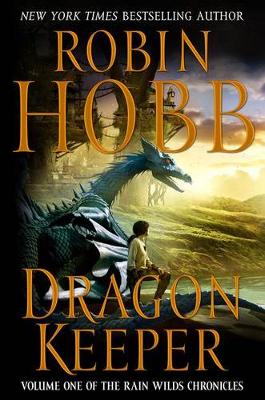Reviewed by layawaydragon on
Hobb provides enough details to understand the serpents backstory for new readers or those that just need a refresher. All within the first several chapters organically without info-dumping. Plus those who've read her previous series get to enjoy the off-hand nods and reappearances of minor characters.
Of course, if you go back to read the other series after finishing Dragon Keeper some information will be spoiled.
Okay, so I'm not the best judge of out-of-order readability since I'm such a Hobb fan and have read all the Elderling books. But seriously, read them all. (Hypnotoad compells you)
Pros:
Breath-taking, descriptive, clever writing
Flush & vibrant world building
Awesomely dynamic & diverse characters
Pitch-perfect tempo
Spot-on switching perspectives
Brilliant use of messages between Keepers of the Birds, it tells an interesting background story during chapter intros that’s relevant and gripping.
Immediately engaging
Tearing up during its prologue
No idea how it’ll turn out
OMFGlob, urgently continuing this series
Meaningful cameos by characters from the Liveship Trilogy
DRAGONS!
ROBIN FUCKING HOBB!
(cough) Sorry, my inner fangirl had a moment at the end there.
Dragon Keeper lays the groundwork for the journey to come and revolves around the cast preparing for it. Getting us ready means showcasing them, their personalities, principals, and perspectives. The Rain Wild Chronicles is a coming of age story for our young dragon keepers and the serpents. (Serpents grow into dragons, in case you're confused.)
I love how diverse, authentic, and substantial the cast of Dragon Keeper is and it only gets better the farther they travel. Hobb is fantastic at building and developing a wide range of characters. They're hardly tokens or props and it shows.
Of course, if you're not into these characters or their journey, it might come off slow like Assassin's Apprentice did for some. Those people were flawed, not the book. But it's vital and if you enjoy it or can make it through, you'll be rewarded justly.
And don't get me started on the world building! I've raved about it in every Elderling series so far and Dragon Keeper is no exception. That ground has been tread already though (since you've read them all, right? Right?) so let's stick with what's new. Before even setting off, cities are built with history, politics, and social strata.
Even if you think Trehaug and Casserick already from The Liveship Trader series, think again. Not only has time passed and things changed, but we get a richer, fuller picture, past and present. Admittedly, our vision is limited to two cities and a boat at the moment but like the characters, it gets better the deeper we go into The Rain Wilds.
Intersectional Feminist Geeks Out Over Dragon Keeper
“I'd worry how accurate this is but GUYS, NEW BOOK DROPPING!"
[spoiler]
The Rain Wilders vs. the Tattooed is a wonderful study in intersectionality. Within their cities, housing is a naturally arising problem they discuss. For instance, segregated sections, not by law as far as we can see, but by racism. Devalued property, white flight, ghettos and hipster classim anyone?
Within the expedition, Greft the git doesn’t understand Tats and refuses to try, being a manipulative bastard playing Oppression Olympics. Greft reminds me of the liberal men who happily support parts of feminism, treating women’s liberation as a means for producing better sex objects rather than an end to oppression.
Tats tries and wants to band together due to their similarities. But he has trouble understanding and keeps putting his foot in his mouth. Will he become the liberal Nice Guytm or an ally?Last, but certainly not least, is the “simple” Rapskal that everyone discounts, bringing ableism into the mix. Because in order for there to be a top dog, there must be one on the bottom. Turning on each other to climbing higher, instead of rebelling is just how it usually plays out.
None of them understands it as an exiled Rain Wilder woman, which is decidedly different and takes on oh so familiar sex shaming hues. However, it's not as simple as getting out from under the boot, because the boot print, inside and out, remains. There is slut-shaming and jealously as each woman finally makes their own choices on the path to liberation.
Aboard The Tarman there’s exploration of classism, racism, and sexism among and between Bingtowners and Wilders. It’s fascinating how they all come together during this expedition yet remain separated by culture, bias, and baggage.
Of course, I can't help but wonder about having a Tattooed young woman in our company. What would she be like? What circumstances would lead her to come aboard? How would the Rain Wilds politics react and change? Considering how and why Rain Wilders welcomed their people, would that change how Greft arranged his hierarchy? Or as a colored woman would she pushed to the bottom like always? Would a more traditional, less marked Rain Wilder young man seek to reestablish what his people wanted?
There is so much to discuss and think about when it comes to Robin Hobb's books.
[/spoiler]
Recommended for:
everyone, no exceptions. Hobb is a living legend in the fantasy realm but don’t let that stop you, non-fantasy fans. Her characters, writing prowess, and storytelling excel past genre barriers (and I’m one who reads a varies amount) and she’s among the greatest authors period.
After finishing the series…
YES! It’s ALL so impeccable. Celebrate for there’s more diversity with sexual orientation, race, and relationship status. The last book, Blood of Dragons, does have a brief rape scene but it is momentous without titillation and a heartwarming but ultimately depressing aftermath. I cannot recommend The Rain Wild Chronicles and all of Robin Hobb’s work enough.
Reading updates
- Started reading
- 30 January, 2014: Finished reading
- 30 January, 2014: Reviewed
